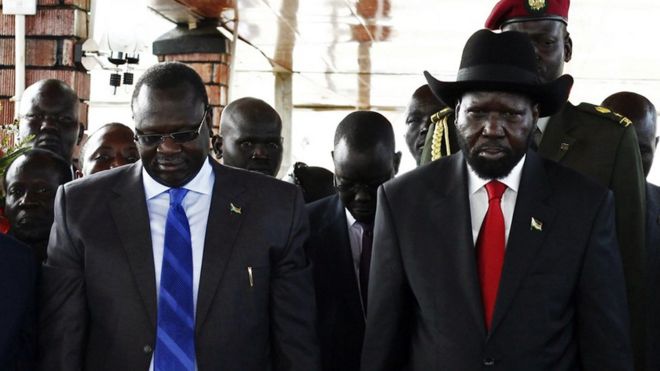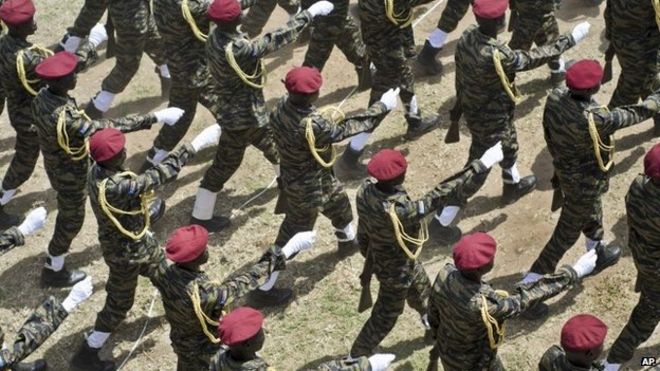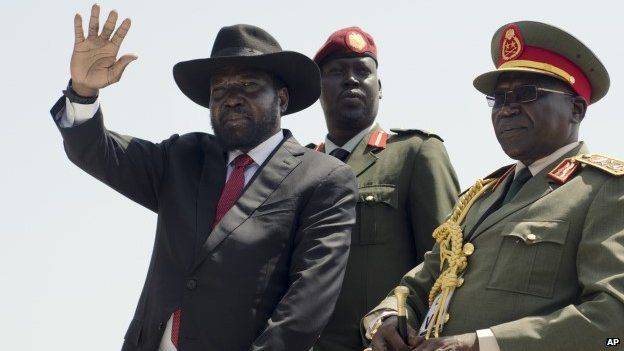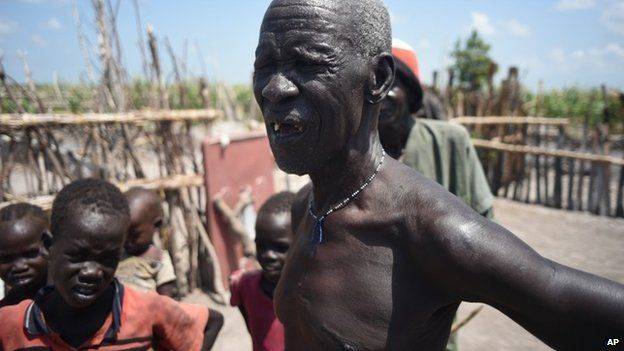sudan
Senior Member
- Oct 17, 2012
- 266
- 11
- 51
"Oil is by far the most important commodity produced in South Sudan. If used effectively, it could spur broader economic growth and propel South Sudan into a period of accelerated economic development and prosperity. For this to happen, tough choices must be made now."
Article 78(1) also places an obligation on oil companies to annually disclose information on any payment made to government agencies. This disclosure requirement supersedes any confidentiality requirements laid out in existing contracts. According to article 78(3): Confidentiality clauses or other clauses in a petroleum agreement that prevent disclosure of information on any payments made and revenues received in connection with petroleum activities conducted in the Republic shall be void to the extent required for disclosure of such information as set out in subsection (1) of this Section. In addition, companies are required to develop local content plans consisting of the following:
• A plan for procurement of national goods and services
• A detailed plan and programme for local recruitment, employment and training, including post-graduate training and scholarships; and
• A plan for the transfer of skills, knowledge, competence and know-how.
Each year, oil companies are required to publish a report describing their initiatives regarding local content taken in the previous year and their results. Like the social and environmental audit discussed above, these reporting requirements carry little or no financial cost for the government of South Sudan and there is no reason why they could not be implemented immediately. By providing this information to the public, the Ministry would facilitate more robust oversight over the sector and a more accountable petroleum industry.
Moratorium on Future Oil Contracts Due to the complexity of the political landscape and the uncertainty that will characterize the transitional period, there is a high risk that the transitional government will find itself entering into long-term commitments on unfavorable terms with unreliable partners in the petroleum 5 sector. Such partnerships threaten to plunge the country further into a self-destructive cycle, in which oil revenue feeds corruption and inequality and does little to consolidate peace or raise the living standards of the South Sudanese people. This strategy recommends that the government put in place a three-year moratorium on future oil contracts, including contracts for service delivery.
The moratorium would prevent the government from entering into additional obligations with private sector actors, but it would not apply to existing agreements. Without the responsibility of negotiating additional agreements, the Ministry of Petroleum and Mining could focus on bringing the oil fields back to full production and implementing the existing laws.
Meanwhile, the moratorium would send a signal to international capital that South Sudan is committed to putting its house in order, and creating an environment that appeals to serious businesses interested in socially responsible investments. The moratorium would also demonstrate to the people of South Sudan that the transitional government is committed to breaking with the corrupt and inefficient practices of the past.
Moratoriums have already been used to good effect in other business sectors in South Sudan. When the regionally autonomous government of Southern Sudan was established in 2005, it put in place a moratorium on forest concessions so that it could review concessions entered into during the war and clarify the existing forest law. The National Legislative Assembly also put in place a moratorium on mining concessions in 2010 pending the passage of a Mining Act. When the Act was passed in 2013, the Ministry lifted the moratorium.
A strong petroleum sector is the key to sustainable peace and long-term prosperity, but South Sudan cannot build such a sector if it enters into long-term obligations based on the short-term demands with which the transitional government will be confronted.
Protection of State and Community Oil Revenue: In recognition of the harm that has been done to communities in oil-producing areas, the Petroleum Revenue Management Act requires that two percent of oil revenue be allocated to oil-producing states and three percent to local government councils in oil-producing states. Currently, these funds are being distributed in lump sum cash payments to local authorities with little or no transparency or accountability. There is an urgent need for some sort of formal structure to manage these funds effectively. The use of community trust models may provide opportunities, in this regard.
In a community trust, oil revenue is vested in the community in its collective capacity. A group of trustees is designated to make decisions about the use of the resources for the benefit of local populations. Trustees are bound by a fiduciary relationship and are legally obligated to act solely in the community’s best interest. Proceeds are invested back into the community through direct payments to community members or through the financing of development projects designed to meet the particular needs of the community. In time, institutional mechanisms such community trusts may help to promote more equitable distribution of resources at the state and local level.
In the meantime, however, there is a need for urgent measures to be put in place to ensure that revenue is not misappropriated or wasted. This strategy recommends that the five percent of oil revenue that goes to oil-producing states and communities be deposited in an internationally audited bank account until measures are put in place to distribute the funds more effectively.
Allocation of Oil Revenue to Priority Sectors: Lastly, this strategy recommends that the warring parties consider placing a restriction on the use of oil revenue that would limit the amount of resources that are wasted on consumption and increase investments in priority sectors such as infrastructure, agriculture, health and education.
Currently, the government allocates approximately 40 percent of its annual budget to security sector spending and another 40 percent to government salaries. Only 0.12 percent of the budget is allocated towards agriculture. This pattern of spending, when coupled with the fact that rates of oil production are projected to decline steadily over the next few decades, could very well condemn South Sudan to a future of increasing poverty and social inequality.
The country must urgently find ways of channelling oil revenue towards investments in non-oil sectors so as to counteract declining oil revenue, spur longer-term development, and diversify the economy. This strategy recommends that the warring parties consider placing the oil revenue that goes to the national government in an internationally audited escrow account that would set strict limits on the amount of funds that could be disbursed for security sector spending and salaries. This would encourage the transitional government to invest more seriously in priority sectors such as agriculture and infrastructure, which could help to spur economic development and thereby contribute to the consolidation of peace.
The percentage of annual revenue allocated towards priority sectors could be progressively increased so as to avoid the destabilizing impact that channeling revenue away from civil service salaries could have on the population in the short term. As investments in priority sectors are increased, the spill over benefits for local economies could help to counteract any losses that people incur by losing access to government jobs.
Concluding Remarks: For South Sudan to emerge from this conflict and set itself on a path to long-term and sustainable peace, it must part ways with the corrupt and inefficient policies and practices of the past. The social, political and economic transformation of South Sudanese society requires bold decision-making and visionary leadership that is able to think beyond short-term political calculations to prioritize the benefit of the people, both those now living as well as future generations.
Oil is by far the most important commodity produced in South Sudan. If used effectively, it could spur broader economic growth and propel South Sudan into a period.
Acknowledgements This strategy document was made possible through financial and technical support from the Centre for Research on Multinational Corporations (SOMO) and the Ministry of Foreign Affairs of the Kingdom of the Netherlands. The SSLS would like to thank the South Sudanese and international experts who participated in the oil policy dialogue for their input, including representatives of the Ministry of Petroleum and Mining and the Specialized Committee on Energy and Mining in the National Legislative Assembly. The views contained in this strategy are those of the SSLS alone and do not necessarily reflect the views of participants in the policy dialogue or the project donors.
Article 78(1) also places an obligation on oil companies to annually disclose information on any payment made to government agencies. This disclosure requirement supersedes any confidentiality requirements laid out in existing contracts. According to article 78(3): Confidentiality clauses or other clauses in a petroleum agreement that prevent disclosure of information on any payments made and revenues received in connection with petroleum activities conducted in the Republic shall be void to the extent required for disclosure of such information as set out in subsection (1) of this Section. In addition, companies are required to develop local content plans consisting of the following:
• A plan for procurement of national goods and services
• A detailed plan and programme for local recruitment, employment and training, including post-graduate training and scholarships; and
• A plan for the transfer of skills, knowledge, competence and know-how.
Each year, oil companies are required to publish a report describing their initiatives regarding local content taken in the previous year and their results. Like the social and environmental audit discussed above, these reporting requirements carry little or no financial cost for the government of South Sudan and there is no reason why they could not be implemented immediately. By providing this information to the public, the Ministry would facilitate more robust oversight over the sector and a more accountable petroleum industry.
Moratorium on Future Oil Contracts Due to the complexity of the political landscape and the uncertainty that will characterize the transitional period, there is a high risk that the transitional government will find itself entering into long-term commitments on unfavorable terms with unreliable partners in the petroleum 5 sector. Such partnerships threaten to plunge the country further into a self-destructive cycle, in which oil revenue feeds corruption and inequality and does little to consolidate peace or raise the living standards of the South Sudanese people. This strategy recommends that the government put in place a three-year moratorium on future oil contracts, including contracts for service delivery.
The moratorium would prevent the government from entering into additional obligations with private sector actors, but it would not apply to existing agreements. Without the responsibility of negotiating additional agreements, the Ministry of Petroleum and Mining could focus on bringing the oil fields back to full production and implementing the existing laws.
Meanwhile, the moratorium would send a signal to international capital that South Sudan is committed to putting its house in order, and creating an environment that appeals to serious businesses interested in socially responsible investments. The moratorium would also demonstrate to the people of South Sudan that the transitional government is committed to breaking with the corrupt and inefficient practices of the past.
Moratoriums have already been used to good effect in other business sectors in South Sudan. When the regionally autonomous government of Southern Sudan was established in 2005, it put in place a moratorium on forest concessions so that it could review concessions entered into during the war and clarify the existing forest law. The National Legislative Assembly also put in place a moratorium on mining concessions in 2010 pending the passage of a Mining Act. When the Act was passed in 2013, the Ministry lifted the moratorium.
A strong petroleum sector is the key to sustainable peace and long-term prosperity, but South Sudan cannot build such a sector if it enters into long-term obligations based on the short-term demands with which the transitional government will be confronted.
Protection of State and Community Oil Revenue: In recognition of the harm that has been done to communities in oil-producing areas, the Petroleum Revenue Management Act requires that two percent of oil revenue be allocated to oil-producing states and three percent to local government councils in oil-producing states. Currently, these funds are being distributed in lump sum cash payments to local authorities with little or no transparency or accountability. There is an urgent need for some sort of formal structure to manage these funds effectively. The use of community trust models may provide opportunities, in this regard.
In a community trust, oil revenue is vested in the community in its collective capacity. A group of trustees is designated to make decisions about the use of the resources for the benefit of local populations. Trustees are bound by a fiduciary relationship and are legally obligated to act solely in the community’s best interest. Proceeds are invested back into the community through direct payments to community members or through the financing of development projects designed to meet the particular needs of the community. In time, institutional mechanisms such community trusts may help to promote more equitable distribution of resources at the state and local level.
In the meantime, however, there is a need for urgent measures to be put in place to ensure that revenue is not misappropriated or wasted. This strategy recommends that the five percent of oil revenue that goes to oil-producing states and communities be deposited in an internationally audited bank account until measures are put in place to distribute the funds more effectively.
Allocation of Oil Revenue to Priority Sectors: Lastly, this strategy recommends that the warring parties consider placing a restriction on the use of oil revenue that would limit the amount of resources that are wasted on consumption and increase investments in priority sectors such as infrastructure, agriculture, health and education.
Currently, the government allocates approximately 40 percent of its annual budget to security sector spending and another 40 percent to government salaries. Only 0.12 percent of the budget is allocated towards agriculture. This pattern of spending, when coupled with the fact that rates of oil production are projected to decline steadily over the next few decades, could very well condemn South Sudan to a future of increasing poverty and social inequality.
The country must urgently find ways of channelling oil revenue towards investments in non-oil sectors so as to counteract declining oil revenue, spur longer-term development, and diversify the economy. This strategy recommends that the warring parties consider placing the oil revenue that goes to the national government in an internationally audited escrow account that would set strict limits on the amount of funds that could be disbursed for security sector spending and salaries. This would encourage the transitional government to invest more seriously in priority sectors such as agriculture and infrastructure, which could help to spur economic development and thereby contribute to the consolidation of peace.
The percentage of annual revenue allocated towards priority sectors could be progressively increased so as to avoid the destabilizing impact that channeling revenue away from civil service salaries could have on the population in the short term. As investments in priority sectors are increased, the spill over benefits for local economies could help to counteract any losses that people incur by losing access to government jobs.
Concluding Remarks: For South Sudan to emerge from this conflict and set itself on a path to long-term and sustainable peace, it must part ways with the corrupt and inefficient policies and practices of the past. The social, political and economic transformation of South Sudanese society requires bold decision-making and visionary leadership that is able to think beyond short-term political calculations to prioritize the benefit of the people, both those now living as well as future generations.
Oil is by far the most important commodity produced in South Sudan. If used effectively, it could spur broader economic growth and propel South Sudan into a period.
Acknowledgements This strategy document was made possible through financial and technical support from the Centre for Research on Multinational Corporations (SOMO) and the Ministry of Foreign Affairs of the Kingdom of the Netherlands. The SSLS would like to thank the South Sudanese and international experts who participated in the oil policy dialogue for their input, including representatives of the Ministry of Petroleum and Mining and the Specialized Committee on Energy and Mining in the National Legislative Assembly. The views contained in this strategy are those of the SSLS alone and do not necessarily reflect the views of participants in the policy dialogue or the project donors.





